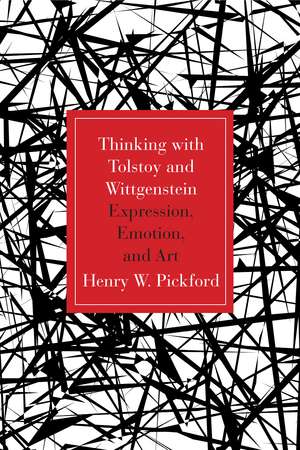Thinking with Tolstoy and Wittgenstein: Expression, Emotion, and Art
Autor Henry W. Pickforden Limba Engleză Hardback – 29 noi 2015
In this highly original interdisciplinary study incorporating close readings of literary texts and philosophical argumentation, Henry W. Pickford develops a theory of meaning and expression in art intended to counter the meaning skepticism most commonly associated with the theories of Jacques Derrida.
Pickford arrives at his theory by drawing on the writings of Wittgenstein to develop and modify the insights of Tolstoy’s philosophy of art. Pickford shows how Tolstoy’s encounter with Schopenhauer’s thought on the one hand provided support for his ethical views but on the other hand presented a problem, exemplified in the case of music, for his aesthetic theory, a problem that Tolstoy did not successfully resolve. Wittgenstein’s critical appreciation of Tolstoy’s thinking, however, not only recovers its viability but also constructs a formidable position within contemporary debates concerning theories of emotion, ethics, and aesthetic expression.
Pickford arrives at his theory by drawing on the writings of Wittgenstein to develop and modify the insights of Tolstoy’s philosophy of art. Pickford shows how Tolstoy’s encounter with Schopenhauer’s thought on the one hand provided support for his ethical views but on the other hand presented a problem, exemplified in the case of music, for his aesthetic theory, a problem that Tolstoy did not successfully resolve. Wittgenstein’s critical appreciation of Tolstoy’s thinking, however, not only recovers its viability but also constructs a formidable position within contemporary debates concerning theories of emotion, ethics, and aesthetic expression.
Preț: 664.97 lei
Preț vechi: 849.62 lei
-22% Nou
Puncte Express: 997
Preț estimativ în valută:
127.24€ • 133.19$ • 105.91£
127.24€ • 133.19$ • 105.91£
Carte indisponibilă temporar
Doresc să fiu notificat când acest titlu va fi disponibil:
Se trimite...
Preluare comenzi: 021 569.72.76
Specificații
ISBN-13: 9780810131705
ISBN-10: 0810131706
Pagini: 240
Dimensiuni: 152 x 229 x 20 mm
Greutate: 0.48 kg
Editura: Northwestern University Press
Colecția Northwestern University Press
ISBN-10: 0810131706
Pagini: 240
Dimensiuni: 152 x 229 x 20 mm
Greutate: 0.48 kg
Editura: Northwestern University Press
Colecția Northwestern University Press
Notă biografică
HENRY W. PICKFORD is associate professor at Duke University. He is the author of The Sense of Semblance: Philosophical Analyses of Holocaust Art, co-author of In Defense of Intuitions: A New Rationalist Manifesto, and the editor and translator of Theodor W. Adorno's Critical Models and Lev Loseff's Selected Early Poems.
Recenzii
"This book is original, ambitious, and extremely well informed. Henry Pickford has managed to say an important new word in a vast intellectual field." —Boris Gasparov, author of Five Operas and a Symphony: Word and Music in Russian Culture
"Pickford’s outline of an aesthetic of expressitivity, based on Tolstoy but reformed by means of Wittgenstein’s philosophy of language, captivates with its masterful, straightforward and lucid presentation. With his slim, but intellectually far-reaching and precisely argued book, Pickford has succeeded in delivering an extremely enriching contribution not only to literary studies, but to cultural studies as a whole." —Matthias Kroß, Wittgenstein Studien
"Pickford’s outline of an aesthetic of expressitivity, based on Tolstoy but reformed by means of Wittgenstein’s philosophy of language, captivates with its masterful, straightforward and lucid presentation. With his slim, but intellectually far-reaching and precisely argued book, Pickford has succeeded in delivering an extremely enriching contribution not only to literary studies, but to cultural studies as a whole." —Matthias Kroß, Wittgenstein Studien
“. . . pervasive and striking . . . Pickford offers the strongest, most philosophically literate and sophisticated argument against the sceptical interpretation of Tolstoy of which I am aware . . . No one has defended the sense of the immediate and the finite in Tolstoy better, and we are fortunate to have such a book to add to the small number of essential works on Tolstoy.” —Modern Language Review
"Thinking with Tolstoy and Wittgenstein is a beautifully written, philosophically sophisticated, and important work that should be of considerable interest to lterary theorists as well as to philosophers concerned with emotion." —Stanley Bates, Middlebury College
"Thinking with Tolstoy and Wittgenstein is a beautifully written, philosophically sophisticated, and important work that should be of considerable interest to lterary theorists as well as to philosophers concerned with emotion." —Stanley Bates, Middlebury College
"Pickford, who is trained in the analytic philosophical tradition, brings formidable Apollonian skills to bear on this Tolstoyan texture. He tames it, smoothes out its anger, annotates the major issues in elegant footnotes, and draws distinctions necessary for responsible intellectual argument (between, for example, our affective reactions to sensations and the more normative emotions triggered by beliefs, judgements, cognitive acts). He shows why Schopenhauer on music delighted and terrified Tolstoy, and how Wittgenstein (who adored Tolstoy, novels and treatises alike) had insights that could calm those confronted by these unmediated emotions... Trained philosophers will whizz through this book. Its exposition is so meticulous, its scholarship so deep and gracious, its terms so lucidly laid out, that such disagreements as do arise can be resolved within the logical grid of its own argument (and Pickford anticipates most of them). The rest of us, like Tolstoy, will stumble and ponder... Because the issues that Henry Pickford discusses—whatever his title says—are not what people think by, but, to borrow the title of one of Tolstoy’s parables, 'What People Live By'. It’s no small risk to map this terrain for the analytic mind." —Times Literary Supplement
Descriere
In this highly original interdisciplinary study incorporating close readings of literary texts and philosophical argumentation, Henry W. Pickford develops a theory of meaning and expression in art intended to counter the meaning skepticism most commonly associated with the theories of Jacques Derrida.
